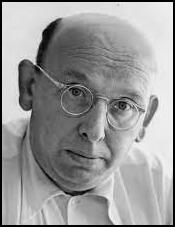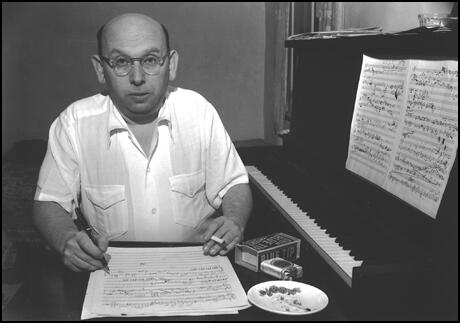Hanns Eisler

Hanns Eisler was born in Germany on 6th July, 1898. The son of the Austrian philosopher Rudolf Eisler and Marie Fischer, the daughter of a butcher.
In 1916 Eisler was recruited into the Hungarian regiment of the Austro-Hungarian Army. He was wounded several times during the First World War and when fighting ceased in 1918 he returned to Vienna. A socialist, Eisler supported the failed Spartacist Uprising in January, 1919.
Over the next few years Eisler studied with Anton von Webern in Vienna and composed Piano Sonarto No. 1 (1923), Palmstrom (1924), Zeitungsausschnitte (1926), The Red Megaphone (1927), Songs for the Struggle (1928) and Song of the Unemployed (1929).
A committed Marxist, Eisler worked with Bertolt Brecht on the musical play, The Measure Taken (1930). He also wrote the music for several German films including Hell on Earth (1931), Song of Heroes (1932), To Whom Does the World Belong (1932) and The Song of the Street (1933).
When Adolf Hitler gained power in 1933, Eisler he was forced to flee from Germany. He settled in the United States where he wrote the music for several Hollywood movies including: The 400 Million (1939), The Forgotten Village (1941), Hangman Also Die (1943), None But the Lonely Heart (1944), Jealousy (1945), A Scandal in Paris (1946) and Deadline at Dawn (1946).

In 1947 the House of Un-American Activities Committee (HUAC), chaired by J. Parnell Thomas, began an investigation into the entertainment industry. The HUAC interviewed 41 people who were working in Hollywood. These people attended voluntarily and became known as "friendly witnesses". During their interviews they named nineteen people who they accused of holding left-wing views.
Eisner was one of those named and like his left-wing friend, Bertolt Brecht, was forced to leave the United States. Eisler moved to East Germany where he continued to write music for the cinema and the theatre. Hanns Eisler, who wrote the East German national anthem, Auferstanden aus Ruinen, died on 6th February, 1962.

